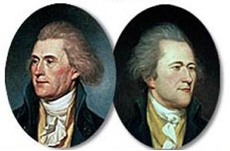Specific Solutions that Only Entrepreneurs Can Provide
This is part 1 of a 5-part article.
 When America decided to follow Alexander Hamilton’s economic model instead of the Jeffersonian system, a number of changes occurred which now haunt our generation.
When America decided to follow Alexander Hamilton’s economic model instead of the Jeffersonian system, a number of changes occurred which now haunt our generation.
Jefferson envisioned a nation of small farm and shop owners that spread around leadership and prosperity, while Hamilton preferred a mercantile system with a few wealthy owners employing the large majority of the populace.
Hamilton felt that an increase in wealth among the leading families would make up for the reduced freedom and less-widespread prosperity under a mercantile economy.
After all, this was the model used by the most powerful nations in Europe.
Ironically, we have now reached a point where the greatest challenges we face are caused by the mercantile system and can likely only be solved by an entrepreneurial mindset.
Funny how history pulls these types of pranks.
Failed Solutions
Unfortunately, the two main sides emphasize government solutions (more government-provided jobs and stricter regulation against corporations and bonuses) versus big-business mercantilism (hire and fire as best fits company projections, and move operations abroad to less hostile regulatory environments with cheaper labor—or in other words, business as usual).
A third view comes from frustrated populists who want Washington to get its act together and fix the economy.
All three of these views miss the point.
Wall Street, Washington, and Main Street still seek Hamiltonian solutions: “Big institutions should fix things for us.”
The specific challenges we face, however, don’t lend themselves to institutional fixes. Our current problems need precisely entrepreneurial-type solutions.
This isn’t the old debate of whether public or private programs are best. The truth is, that debate nearly always promoted institutional fixes.
What we need now are patently non-institutional innovations.
To be continued…
***********************************
 Oliver DeMille is the founder and former president of George Wythe University, a co-founder of the Center for Social Leadership, and a co-creator of TJEd Online.
Oliver DeMille is the founder and former president of George Wythe University, a co-founder of the Center for Social Leadership, and a co-creator of TJEd Online.
He is the author of A Thomas Jefferson Education: Teaching a Generation of Leaders for the 21st Century, and The Coming Aristocracy: Education & the Future of Freedom.
Oliver is dedicated to promoting freedom through leadership education. He and his wife Rachel are raising their eight children in Cedar City, Utah.






Recently I heard a talk from one of the people who votes on what gets put into textbooks used in public schools (I’m sorry, but I’ve forgotten his name). He was from Texas, and even though each state has some kind of group that decides what their textbooks should have, history shows that the regulations Texas adopts are then adopted by most states.
Mercantilism is dominantly based in scarcity mentality. It is about gathering as many resources as possible because there is a scarce amount of these resources.
What does that have to do with textbooks in Texas? According to the talk I heard, the idea of scarcity is to be one of the foundational principles in these textbooks. The principle of abundance is to be completely removed.
With over 80% of Americans being educated in the public system, the already widespread fear that comes with scarcity mentality is only going to increase in future generations.
If you or your children are involved in public school (or even if you’re not and you care about the future), get involved.